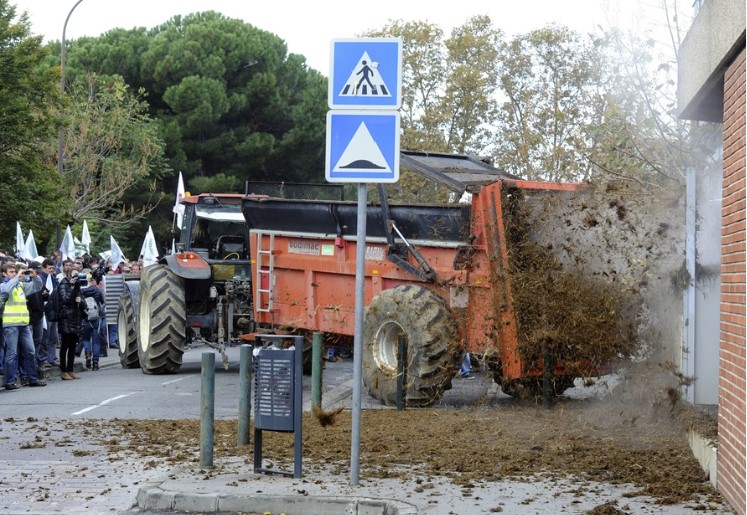
Farmers in the Brittany region of France on Wednesday staged a protest using tractors in the city of Rennes in response to the government’s agricultural policies.
The protesting farmers argue that they are burdened with excessive regulations in the context of their agricultural activities.
According to local reports, upon reaching the headquarters of the Brittany Regional Council, the farmers spread straw in the parking lot and scattered official documents.
from protests…FRANCE 🇫🇷 Farmers throwing eggs at police in Saint-Brieuc. Trailers with manure are starting to be dumped in front of the prefecture. pic.twitter.com/CFDVosUsTD
— Peacemaker (@peacemaket71) December 8, 2023
Later, the farmers proceeded to the front of the regional directorate of agriculture and forestry with their tractors, where they spread grass.
According to a statement from the Rennes police on the social media platform X, the farmers conducted the protest using 100 tractors.
🇫🇷French farmers have resorted to throwing manure on government buildings as a form of protest against high taxes levied on the agricultural sector.#FarmersProtest #France #FrenchFarmers #farmers #Economics #protest #Europe pic.twitter.com/768NXWtjBp
— Attentive Media (@AttentiveCEE) December 8, 2023
Whilst the French are famous for their readiness to protest, as we’ve seen elsewhere in the West, there is a concerted attack on farmers, and the food supply more generally, and it’s only a matter of time before totalitarian legislation comes for France’s farmers; as the following analysis from John Lichfield in TheLocal.fr:
French farmers’ signpost protests indicate a major clash on the horizon
If you’re in rural France you might have seen village signposts turned upside down – rather than a simple prank this is a protest from young French farmers which could, writes John Lichfield, be the start of a major clash between farmers, environmentalists and the government.
Normandy has been turned upside down. So, it appears, have large parts of France.
In my corner of Calvados almost all the name signs at the edge of towns and village have been unbolted and replaced the wrong way up. A scribbled sign beside the road announces: “Nous marchons sur la tête.” (We are walking on our heads).
French farmers are easily my favorite protesters in the entire world. Always entertaining and creative about their protest tactics.
Canadian farmers, American farmers … watch these guys. Copy their tactics. 🔥🔥🔥 https://t.co/gjJYTlnjLo
— Wall Street Silver (@WallStreetSilv) December 7, 2023
Is this the action of a night-time gang of rural surrealists? Does it announce the return of the Gilets Jaunes?
No. It is part of an agricultural “rebellion of the signs” which started in the Gard in south-eastern France two weeks ago and has spread like a prairie fire across the country.
The protest, devised by Jeunes Agriculteurs, the young farmers organisation, warns of more disruptive action to come if the government does nothing to address a thicket of agricultural grievances.
French farmers protesting? How unusual.
Actually, it has become less common than it used to be. Farmers have been relatively quiet for several years. They snubbed the Gilets Jaunes protests which began in rural and outer suburban France five years ago.
Farmers in France continue to block roads pic.twitter.com/LXWfQlWgJT
— Sprinter (@Sprinter00001) December 8, 2023
The government evidently takes the threat of a farming revolt seriously. The Prime Minister Elisabeth Borne met agri-union leaders on Tuesday and caved in instantly to two of their main demands.
Farmers were supposed to pay out €47 million next year in increased licence fees for pumping water from the ground and for pumping pesticides and other chemicals into it. Those provisions have now been cut from the 2024 national budget before it even passed through parliament.
Other grievances remain. Farmers are furious, inter alia, about an unratified EU treaty with South America which would bring cheap Brazilian and Argentinian beef into France.
They also complain about the rise in the price of agricultural diesel fuel (on which they already pay much reduced tax) and delays in the payment of the EU subsidies (of which France receives €7.5 billion a year, more than any other country).
Most of all they complain that France has no clear strategy for balancing the needs of farming and an ecologically friendly future.
Philippe Bardy, leader of the main agricultural union, the FNSEA, in Tarn where the upside-down protest began, said: “Government wants us to change the way we farm; it also urges us to produce as much as possible in the name of food sovereignty. They pressure us to keep salaries high; they also demand that we reduce prices to calm inflation.”
He has a point. Successive French governments for seven decades (with one or two exceptions) have pursued a schizophrenic, or hypocritical approach to farm policy.
They have paid lip-service to “family farms” and “France’s exceptional food quality”. They have allowed or encouraged EU subsidies to be weighted towards the intensive, chemical-drenched cereal farms and large agri-food industries which make France one of the world’s largest mass exporters of food.
Farming unions are also to blame. The once dominant union, the Fédération Nationale des Syndicats d’Exploitant Agricoles (FNSEA), has traditionally been dominated by the cereals interests which have turned swathes of northern France into a green desert. It has resisted any radical shift in EU subsidies away from large farms to small.
There were 750,000 French farms at the turn of the 21st century. There are now around 450,000.
Despite this steep fall in numbers, two out of five French farmers earn less than €4,500 a year. Without subsidies from Brussels, tens of thousands of them would make a loss.
One of my neighbours in Normandy happens to be president of the Calvados beef farmers. He once explained to me the economics of what, for France, is a big-to-medium farm with 280 animals.
Daniel Courval and his wife Christine make €25,000 profit from two people’s annual work but the farm receives €50,000 in subsidies from the EU Common Agricultural Policy (CAP.) Without them, they would make a €25,000 annual loss, and there would be no farm.
This fragile world is threatened by two new-ish factors. More than half of France’s remaining farmers are over 50 years old and will retire before the end of the next decade. There is, so far, no clear national policy for encouraging would-be young farmers to replace them.
Farming is the second biggest source of carbon emissions in France after transport.
Agriculture is supposed to reduce its greenhouse emissions such as methane- a large part of which emanates from the front and back of cows – by 16 percent by 2030.
And what of humans who eat the WEF-endorsed vegan diet which causes them to emit 7-times more ’emissions’ of their own, when compared to meat eaters?
I think it’s appropriate during their climate/Communism meetings to point out an important fact. While they try to make the argument for methane/farts in cows, they fail.
Vegan men fart 7 times more than non-vegans. I’ll take my animal protein, thanks.https://t.co/eiDXKiFkl2— Dr. Lynn Fynn-derella🐭 (@Fynnderella1) December 6, 2023
Beef production is falling but beef-eating is increasing again. The government wants France to produce more of its own food. This implies more intensive farming; the ecological transition implies the opposite. French farmers detest the idea of imports from countries which impose weaker environmental constraints than the EU.
Emmanuel Macron claims, with some reason, to be a farm-friendly President. He has promised to fight post-Brexit cuts in the EU farm subsidies. He is refusing to sign the Mercosur – South American – trade treaty in its present form.
But his government has skirted around or paid lip-service to solving the contradictions listed above, between productivity and ecology, mass-production and quality production, family farms and cheap food. So, until now, have the big farm unions.
At some time before the end of the year, the government is expected to address these issues in a “farming pact” or “orientation law for the future of agriculture.|”
If it fails to grapple with the core of the problem – and possibly even more so if it does – rural France could be turned upside down for real next year. [Local]
Hey friends, it’s time to wake up!
If a few more people choose to support my work, I could expose more lies, root out more corruption, and call out more hypocrites. So, if you can afford it, please support my endeavor by either using PAYPAL or the DonorBox below (PAYPAL & Credit Cards / Debit Cards accepted)…
If you are a crypto fanatic, I do now accept crypto donations:
BTC: 1AjhUJM6cy8yr2UrT67iGYWLQNmhr3cHef (Network: Bitcoin) USDT: 0x490fe5d79d044a11c66c013e5b71305af0a76c1b (Network: Etherum ERC20)
You should join my newsletter to get a daily compilation of different breaking news, pictures and videos… YOU WILL LOVE IT!
Thank you,
Manuel













I love when farmers dump KWAP on the ungodly.
Give ’em a hand!! hoo-ray for the farmers for standing up. I would dump cat’s litter box full of manure if I was there instead of being in Ala.